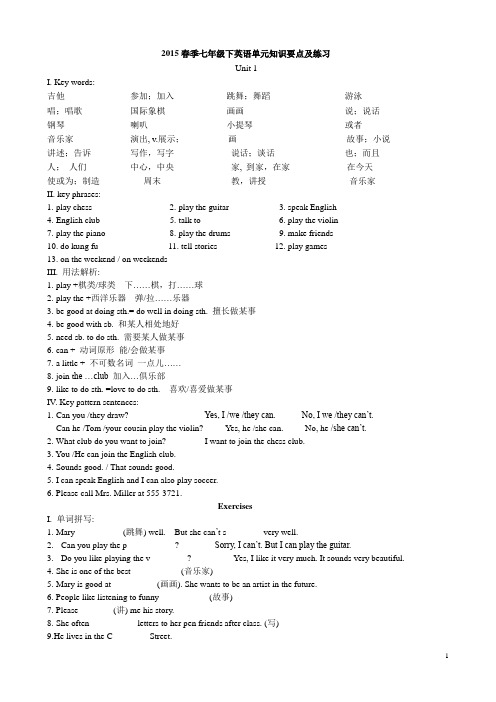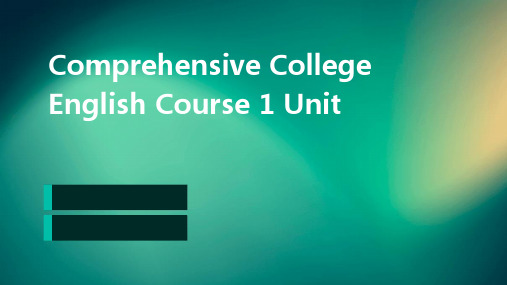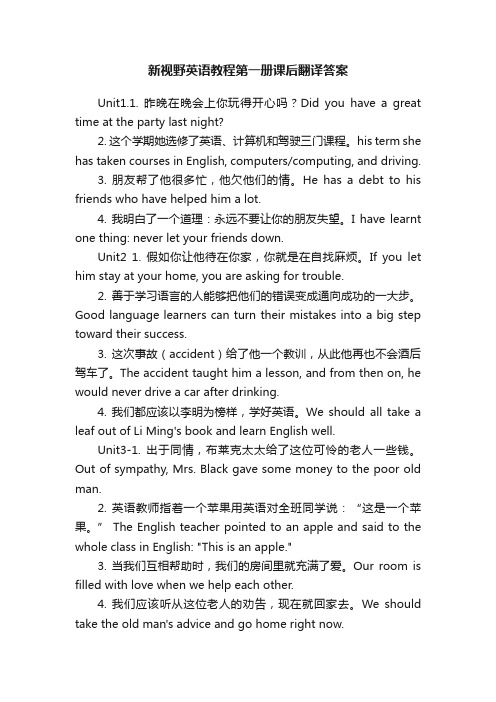Unit1WordsandTheirStories
英语:Unit1 《Words and their stories》教案(上海新世纪版S2B)

Unit1 Words and Their Stories一、单元分析( Unit Analysis )(一)单元地位( Unit Position )1.本课谈及了词汇故事和谚语。
教师可围绕这一内容,设计活动让学生参与资源共享,扩充对这方面知识的了解。
这对丰富学生的语言知识,提高英语学习的兴趣都很有帮助。
2.围绕“词语故事”这一主题,让学生通过互相交流共享,训练复述故事的能力。
在此过程中,特别注重一下“Giving Examples” 和“Making Yourself Understood” 这两个语言功能的学习。
3.本课出现的语法—不定式的完成式,学生之前应当已接触过。
通过这一单元,教师应在复习原有不定式的基础上如不定式的进行式等,再重点描述并操练不定式的完成式。
如The expression is said to have come from the name of a hard-working animal --- the beaver. / This phrase seemed to have arrived with the modern paper bag. 对于这一语法现象,教师有必要在课堂教学中加以一定的句型操练,加深学生对不定式的完成式的认识。
(二)单元目标( Unit Target )1.了解一些词汇故事和谚语,并能背出一些常用谚语和习语。
2.训练复述故事的能力。
3.学会“Giving Examples” 和“Making Yourself Understood”两类语言功能。
4.复习巩固以前所学过的动词不定式的各项内容,熟练掌握动词不定式的完成式的应用。
(三)单元重点( Unit Points )1.关键词:◆语言知识类complain, seem, wrap, explore, import, plain, have an important part in, exchange for,put value on, be sure of, be supposed to do / be◆交际功能类常用谚语与俗语Better late than never.A bird in the hand is worth two in the bush.Every little makes.Honesty is the best policy.Habit is second nature.As you sow, so shall you reap.An hour in the morning is worth two in the evening.East, west, home is the best.One is never too old to learn.All work and no play makes Jack a dull boy.…2.功能: 参考课文第13页Useful language1) Giving examples● … i s a good example for us.●Let me cite a few instances: …●… such as …●… for instance …●Let me take … as an example: …●Allow me to cite an example: …●Not only that.2) Making yourself understood●Have you got it?●Do you understand what I mean?●Is that clear to you?●Am I right saying that …?●Did I make everything clear?●Are you with me?●Have I made myself clear?●You got it, didn’t you?3.语法点:本课在复习巩固之前所学过的动词不定式的各项内容基础上,熟练掌握动词不定式的完成式。
高中英语必修五《unit1 Great Scientists》示范说课稿

《unit1 Great Scientists》说课稿各位评委老师,上午好!我是号考生,我今天说课的题目是《unit1 Great Scientists》。
我主要从教材分析、教学方法与策略、教学过程、板书设计等几个步骤向大家详细地讲解我对这节课的安排。
一.说教材1. 教材内容本节课是人教课标版必修5第一单元的第一课时的Reading部分,是该单元的主要内容,它介绍了英国著名医生John Snow是如何通过考察、分析、探究的科学方法,发现并控制“霍乱”这种传染病的。
通过阅读课文,使学生感悟科学家的周密观察、勇于探索、认真分析的科学精神,使学生了解科学方发现的全过程具有其科学的严密性。
2. 教学目标结合单元教学要求和本课特点,充分考虑学生的年龄特点、认知水平,遂将本课的教学目标确定为:知识目标1) Get students to learn the useful new words and expressions in this part.2) Let students learn about some great scientists and their contribution.3) Have students read the passage and know about John Snow and how he defeated “King Cholera”.能力目标1) Develop students’ reading ability and let them learn different reading skills.2) Enable students to talk about great scientists and tell their stories.情感目标1) Let students learn from great scientists, stimulate their love and respect for them and develop their moral qualities.2) Develop student’s sense of cooperative learning.3. 教学重点因为本组教材的重点了解项目是“John Snow 破解King Cholera难题”,所以确定本课的教学重点是:1) Let students learn about some great scientists and their contributions.2) Get students to read the passage and know about John Snow and how he defeated “ King Cholera”.3) Have students learn different reading skills.4.教学难点考虑到学生拓展阅读能力,语言输出能力等方面还需进一步努力,所以将本课的教学难点确定为:1) Develop students’ reading ability.2) Enable students to talk about great scientists and tell their stories.3) Let students learn how to organize scientific research.二.说教法和学法1. 教学方法引导学生独立思考,合作学习,进行师生、生生互动的“任务型”教学,设计了许多易于操作的任务型活动。
2015春季新人教版七下英语Unit1单元知识要点及练习与答案

2015春季七年级下英语单元知识要点及练习Unit 1I. Key words:吉他参加;加入跳舞;舞蹈游泳唱;唱歌国际象棋画画说;说话钢琴喇叭小提琴或者音乐家演出, v.展示;画故事;小说讲述;告诉写作,写字说话;谈话也;而且人;人们中心,中央家, 到家,在家在今天使或为;制造周末教,讲授音乐家II. key phrases:1. play chess2. play the guitar3. speak English4. English club5. talk to6. play the violin7. play the piano 8. play the drums 9. make friends10. do kung fu 11. tell stories 12. play games13. on the weekend / on weekendsIII. 用法解析:1. play +棋类/球类下……棋,打……球2. play the +西洋乐器弹/拉……乐器3. be good at doing sth.= do well in doing sth. 擅长做某事4. be good with sb. 和某人相处地好5. need sb. to do sth. 需要某人做某事6. can + 动词原形能/会做某事7. a little + 不可数名词一点儿……8. join t he …club 加入…俱乐部9. like to do sth. =love to do sth. 喜欢/喜爱做某事IV. Key pattern sentences:1. Can you /they draw? Yes, I /we /they can. No, I we /they can’t.Can he /Tom /your cousin play the violin? Yes, he /she can. No, he /she can’t.2. What club do you want to join? I want to join the chess club.3. You /He can join the English club.4. Sounds good. / That sounds good.5. I can speak English and I can also play soccer.6. Please call Mrs. Miller at 555-3721.ExercisesI. 单词拼写:1. Mary __________ (跳舞) well. But she can’t s________ very well.2. - Can you play the p___________? - Sorry, I can’t. But I can play the guitar.3. - Do you like playing the v________ ? -Yes, I like it very much. It sounds very beautiful.4. She is one of the best ___________(音乐家)5. Mary is good at __________(画画). She wants to be an artist in the future.6. People like listening to funny ___________(故事)7. Please _______ (讲) me his story.8. She often __________ letters to her pen friends after class. (写)9.He lives in the C________ Street.10. Miss Zhang is an English teacher. She t____________ us English.11. There are four p________ in my family. They are my father, my mother, my sister and I.12. I often help my mom do housework on the w________ after doing homework.13. She can’t play the p__________ very well, but she plays the drums very well.14. Miss Green is a good teacher. She is good w______ his students.15. What club can I j________, please? The soccer job.II. Choose the right answers:( ) 1. Bill can play _____ violin but he can’t play _____ chess.A. the, 不填B. the, theC. 不填, theD. a, 不填( ) 2. _____ does he want to join our club?A. WhatB. HowC. WhyD. Where( ) 3. Victor sings well. He can _____ in our school music festival.A. isB. areC. beD. am( ) 4. Our school show is _____ 6:00 pm _____ Sunday.A. at, onB. on, inC. in, atD. on, at( ) 5. Jennifer’s friends are _____.A. musicB. musiciansC. teacherD. people( ) 6. Can Lucy dance very __________?A. goodB. wellC. niceD. much( ) 7. The boys often play __________football in ________ afternoon.A. /; anB. the; anC. /; theD. a; the( ) 8. They often help kids _____ dancing.A. onB. withC. toD. at( ) 9. Please call Tom ____0811-65784A. withB. toC. forD. at( ) 10.It’s an English class. Please don’t _________ Chinese.A. sayB. talkC. tellD. speak( ) 11.Sam is a _________ swimmer. He can swim very ________.A. well, goodB. good, wellC. good, goodD. good, fine( ) 12.Jeff’s sister can’t swim _____ dance.A. andB. butC. and notD. or( ) 13.Lily ________ like to play chess with me.A. don’tB. doesn’tC. can’tD. isn’t( ) 14. Our school wants two good teachers _____ the School Art Festival.A. withB. ofC. forD. at( ) 15. He can ____ Chinese kung fu.A. doB. makeC. haveD. play( ) 16. We don’t have_______ time. But there are_______ clothes to wash(洗).A. much; muchB. much; manyC. many; muchD. many; many( ) 17. -- Can you speak Russian? -- Yes, but only ____.A. littleB. a littleC. fewD. a few( ) 18. She can’t ____ the difference between the two cars.A. sayB. talkC. speakD. tellIII. 完形填空先通读下面短文,根据短文内容,从短文后各小题所给的A、B、C、D四个选项中选出可以填入空白处的最佳答案。
大学英语综合教程1UNIT

True/False Statements
Students listen to a recording and decide whether a given statement is true or false.
Analysis of Listening Materials
Identifying the main idea
• Retrieving specific information: The ability to quickly and accurately identify and retrieve specific information from a given audio material, such as names, dates, or numbers.
Unit 2
Listening and Speaking Skills: 本单元将重点培养学生的英语听说技能。学生将通过听录音、看视频等方式练习听 力和口语表达,提高英语交际能力。
Unit 3
Reading and Writing Skills: 本单元将重点培养学生的英语阅读和写作技能。学生将通过阅读英文文章、 写英文短文等方式练习阅读和写作能力,提高英语书面表达能力。
Comprehensive College English Course 1 Unit
目录
• Course Introduction • Listening comprehension • reading comprehension • Oral expression • Writing skills • Cultural background knowledge
Gapfill Exercises
Provide gapfill exercises where students fill in missing information based on the text.
新视野英语教程第一册课后翻译答案

新视野英语教程第一册课后翻译答案Unit1.1. 昨晚在晚会上你玩得开心吗?Did you have a great time at the party last night?2. 这个学期她选修了英语、计算机和驾驶三门课程。
his term she has taken courses in English, computers/computing, and driving.3. 朋友帮了他很多忙,他欠他们的情。
He has a debt to his friends who have helped him a lot.4. 我明白了一个道理:永远不要让你的朋友失望。
I have learnt one thing: never let your friends down.Unit2 1. 假如你让他待在你家,你就是在自找麻烦。
If you let him stay at your home, you are asking for trouble.2. 善于学习语言的人能够把他们的错误变成通向成功的一大步。
Good language learners can turn their mistakes into a big step toward their success.3. 这次事故(accident)给了他一个教训,从此他再也不会酒后驾车了。
The accident taught him a lesson, and from then on, he would never drive a car after drinking.4. 我们都应该以李明为榜样,学好英语。
We should all take a leaf out of Li Ming's book and learn English well.Unit3-1. 出于同情,布莱克太太给了这位可怜的老人一些钱。
Out of sympathy, Mrs. Black gave some money to the poor old man.2. 英语教师指着一个苹果用英语对全班同学说:“这是一个苹果。
七年级英语上册Unit1PPT课件

01
Unit Overview
Unit Theme
• The theme of this unit is "Exploring Our World". It aims to introduce students to the vast and diverse world around them, encouraging them to appreciate and understand different cultures, environments, and perspectives.
要点一
Role-Playing Activities
Encourage students to role-play different scenarios related to the lifeboat drill, allowing them to practice their communication and decision-making skills.
or personal reflections on the content.
06
Learning Strategies and Skills
Development of learning plans
明确学习目标
自我评估与调整
引导学生设定明确的学习目标,包括 短期和长期目标,以便他们了解自己 要达到的标准。
The unit concludes with a review of the theme and a summary of the key points covered throughout the unit.
02
Vocabulary learning
外教社综合教程第3版3Unit 1 Words and Expressions for Text I

Fresh StartEvelyn HeraldWords and Expressions:pitiful: adj. 令人同情的;可怜的deserving or causing you to feel pity同义词: patheticThe horse was a pitiful sight (= because it was very thin or sick) .这匹马看上去可怜兮兮的。
2 卑微的;卑鄙的not deserving respect同义词: poora pitiful effort/excuse/performance不精彩的努力/ 借口/ 表现first-gradish: adj. having the qualities and characteristics of a first-grade student (In most cases, the word is considered as a synonym of naïve or inexperienced.)-ish: added to nouns and names to form adjectives which indicate that someone or something is like a particular kind of person or thing.childish, girlishdistress: n. 忧虑;悲伤;痛苦a feeling of great worry or unhappiness; great sufferingThe newspaper article caused the actor considerable distress.报上的文章给这位演员带来极大的痛苦。
distinct: adj. 1 清晰的;清楚的;明白的;明显的easily or clearly heard, seen, felt, etc.His voice was quiet but every word was distinct.他说话声音不大,但字字清晰。
2021_2022学年新教材高中英语Unit1 教学知识细解码课件外研版选择性必修第一册

知识要点 6 cheer up(使)高兴起来,(使)振作起来 (教材 P3) On a typical day,we spend our time cheering up patients,their families,and more often than not,the hospital staff, too! 在一个特殊的日子里,我们花时间让病人、病人家属,通常还有 医院工作人员振作起来!
[即学即练] 单句语法填空/完成句子 ①Carmen Elcira heard him sigh,but she saw,also,that he was _am__u_s_e_d (amuse). ②The _a_m_u_s_in_g_ speaker kept us a_m__u_s_e_d at the meeting.(amuse) ③ Reading and seeing movies are among my _a_m_u_s_e_m_e_n_t_s (amusement). ④T_o__o_u_r_a_m__u_se_m__e_n_t ,the actor jumped up and down on the stage. 令我们感到有趣的是,那个演员在舞台上跳来跳去。
give a farewell entertainment to sb.
为某人举行欢送会
(3)entertaining adj.
愉快的,有趣的,引人发笑的
entertainer n.
款待者;表演娱乐节目的人
[即学即练] 单句语法填空/完成句子 ①You could entertain the person _to_ an afterwork drink. ②It was said that no one was ever bored with his performance; his excellent acting made everything _e_n_te_r_t_ai_n_i_n_g__ (entertain). ③Apart from providing _e_n_te_r_ta_i_n_m_e_n_t__(entertain),the website also turns out to be a helpful learning tool. ④When I arrived home,my husband was lying on the floor, __en_t_e_r_ta_i_n_in_g__th_e__k_id_s_w__it_h__ toys. 当我到家时,我丈夫正躺在地板上,用玩具逗孩子们玩。
- 1、下载文档前请自行甄别文档内容的完整性,平台不提供额外的编辑、内容补充、找答案等附加服务。
- 2、"仅部分预览"的文档,不可在线预览部分如存在完整性等问题,可反馈申请退款(可完整预览的文档不适用该条件!)。
- 3、如文档侵犯您的权益,请联系客服反馈,我们会尽快为您处理(人工客服工作时间:9:00-18:30)。
• expect sth. / that
expect to do
• expect sb. to do
be expected to do
• had expected to do原以为…但事实
并非如此
• I had expected to be near my object by nbuotwe, verything still seemed alien to
• He is more or less drunk. • They have more or less finished their
homework.
• More than one house ____ burnt down in the fire.
• more than + one + n. + V. 单数
• was/ were supposed to do常用来把本应当 发生的事情于实际发生的事进行对照
• We were supposed to arrive at 6. But we are late.
• protest sth. / that
• protest the mistreatment of prisoners
• .‘make a complaint to sb. about sth.
explore
• [T] to discuss or think about something carefully
• Management need to explore ways of improving office security.
• complain vt.& vi. 抱怨,投诉 • 1) She complained that he had been rude to
her. + that…… • 2) He’s always complaining. vi. • 3) complain (to sb.) about / of sth. • complain bitterly about the injustice of the
• The North American beaver is widely known for its habit of building dams and for its closely knit family units. The construction of the dam produces a small- to moderate-sized beaver pond that helps to increase the biological diversity of the surrounding area as well as conserve water and maintain water flow.
• put value on 重视,定价= attach value to 重视
• Mother puts a great deal of value on good manners.
• The government put great value on quality education.
• You’ve put too high a value on the painting. It’s only worth $10,000.
• expect …of sb. 对……的期望(要求)
• The boy’s parents expected too much of him.
• Teachers always expect a lot of their
students.
• require…of sb.
• I am willing to do whatever my country requires of me.
• put/place/lay (great) emphasis on
• attach importance to
• or more • more or less 或多或少 • All the passengers were more or less
wounded in the accidents.
• solid adj. 1). 牢固的,结实的 • The table looks nice and solid. • This old house has a remarkably solid foundation. 2). 固体的 • Water in a solid state is ice. • My father is so ill that he can not eat solid food. 3) 实心的 • A cricket ball is solid. It has no air in it. 4). 纯的,完全的 • The spoon is solid silver. • The cloth is solid blue. 5). 充分的,确实的,可靠的 • I have solid evidence to prove that he is guilty.
• I‘m going to explore the possibility of a parttime job. [I and T] travel into or through (a place, esp a country) in order to learn about it 探险, 考察
• explore the Arctic regions / the Amazon jungle
• We urged Mike to go to the cinema with us, but he protested that he had lots of work to do.
• in protest( against) • The citizens refused to buy foreign goods in
• pack v.打包,挤满, 把…弄结实 • Pack the books. • The crowd packed the gallery. • Pack the soil firmly. • packed adj. (crowded) • pack up 收拾行李 • Have you packed up your things? • a pack of cigarettes
• We need to carry out a full exploration (= examination) of all the alternatives.
• wrap up / in/ round • I've still got a few Christmas presents to
wrap up. • The baby was wrapped in wool clothes
protest.
• mind doing sth. • change/alter one’s mind • be of the same mind • bear /keep sth. in mind • make up one’s mind(s) • mind one’s own business • mind one’s p’s and q’s 要特别当心,说话
• protest against / about/at • Thousands of people blocked the street,
protesting against the new legislation.
她极力反对别人说她势利眼.
• She protested strongly at being called a snob.
要小心
• creature 生物[ C ] , 人 ( 指人时常带有爱怜 或轻蔑的感情色彩
• Alaskan Eskimos believe that every living creature possesses a spirit.
• The poor creature now has no home, family or friends.
• mexep. ect to have done 表示动作的完成
• He expects to have written the last
cbhyaptotemr orrow morning.
• suppose/ supposing (that) conj.( 假设) • Suppose his statement is right. • Supposing (that) this is not the right way to
• be eager / anxious to do sth. 渴望做 • They are eager/anxious to know whether they
have been chosen or not. • be eager /anxious for • be eager for success
and was far too hot on such a sunny day.
• The events are wrapped in mystery. • He wrapped his meaning in a lot of
pseudo-scientific jargon.
• eager beaver 热心工作的人
territory
• The plane was flying over enemy territory. • 野生动物不许其他动物进入它们的领地。 • Wild animals will not allow other animals to
• What a poor creature!
• remove… from • remove one’ eyes from the picture • The agreement removes the last serious
